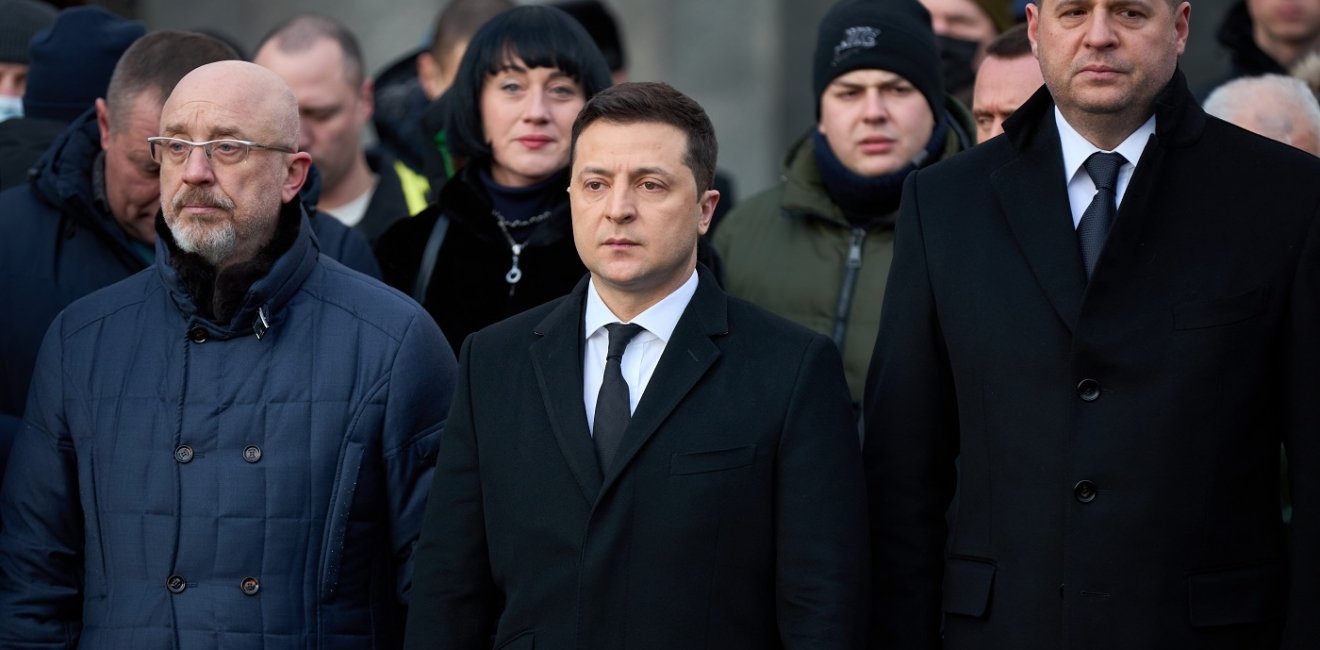
A blog of the Kennan Institute
BY MYKHAILO MINAKOV
Political processes change dramatically during a time of war. In the early stages of the war, the usual competition between the ruling group and the opposition is dampened, while society becomes more disciplined and united around the government. But the longer the war goes on, the more politics adapts: either it further organizes around the leader of the nation at war or the usual competition returns, but posing an unusual threat to national security.
Ukraine seems to be entering the second phase. After four months of the undisputed unity of all political groups around national defense, July offers some early signs of a much more multifaceted politics in Kyiv. Two highly visible political processes are noteworthy: a return to the deoligarchizing agenda and the redistribution of roles on the presidential team.
Deoligarchization
Among the many impacts of the Russian war on Ukraine, there is one that concerns the role of the oligarchs in Ukrainian politics. Russian shelling of numerous industrial plants and the energy infrastructure across Ukraine has destroyed the economic foundations of the resources used by oligarchs to influence politicians in Kyiv. In conjunction with President Zelensky’s prewar deoligarchization policy, this situation creates momentum for uprooting the oligarchy in Ukraine.
Zelensky’s prewar agenda for 2022 included deoligarchization as one of its key elements. In 2021, Act 5599, the “Anti-Oligarch Act,” was approved stipulating the creation of a special institution to identify individual oligarchs through an assets test and to limit their influence on society, political groups, and government. The Ministry of Justice planned to implement the twenty-step plan to uproot the oligarchs. But this policy was postponed when the Russian invasion of Ukraine changed everyone’s priorities.
Despite the change in priorities, however, deoligarchization is moving ahead—in more ways than one. The Russian destruction of plants such as the Azovstal iron and steel works in Mariupol or the oil refining plant in Kremenchug was certainly a considerable blow to Rinat Akhmetov and Igor Kolomoysky. However, the anti-oligarchic legislation of 2021 hits the oligarchs even more: it requires them to leave politics and sell their media holdings as soon as possible. Just recently Vadym Novynsky relinquished his MP mandate, while Rinat Akhmetov exited his media business. These steps now vacate the legal grounds—having an undue influence on politics and the mass media—that would have put them on the official registry of oligarchs.
Changes on the Zelensky Team
On Sunday evening, July 17, President Zelensky addressed the nation, announcing changes in the leadership of the General Prosecutor’s Office (GPO) and the Security Service of Ukraine (SSU). The president suspended General Prosecutor Iryna Venedyktova and SSU head Ivan Bakanov. Both decisions are explained by the fact that members of the presidential team must take responsibility for traitors in the ranks of their institutes. Venedyktova and Bakanov themselves were trusted members of the team and are not directly accused of wrongdoing.
This decision was not an easy one for Zelensky to make. Bakanov, the president’s childhood friend and lifelong companion, joined the SSU right after Zelensky’s and his party’s electoral victory in 2019. Bakanov led an uneasy process of SSU reform and a reduction of the oligarchs’ influence on the service. Venedyktova continued the GPO reform begun by Ruslan Ryaboshapka in 2020. Both were key figures on the ruling team and safeguarded its stable growth of power as Zelensky’s presidency matured.
Both officials are suspended, not fired. To fire them, the president would need parliamentary approval, even during a time of war. To avoid a longer process, the president chose a faster process, which would help ensure stability in both offices during the change of leadership. The newly appointed acting heads of both organizations are the former first deputies—Oleksiy Symonenko in the GPO and Vasyl Malyuk in the SSU—so that the organizations can continue operating with maximum efficiency. Neither is from the old cadre of Zelensky’s business partners; both have earned the president’s trust over the past two years.
Many trace the president’s decision not only to the results of an investigation into the actions of some prosecutors and SSU officers during the early days of the war but also to the growing pressure on Andriy Yermak, chief of Zelensky’s staff. On July 8, U.S. congresswoman Victoria Spartz sent a letter to President Joe Biden raising issues with Yermak’s work in his official position and in his contacts with the U.S. administration. On July 11 the congresswoman stated that Yermak should resign because he had been an ineffective public administrator during the war, and for organizing a smear campaign against her.
These appeals fell on receptive government ears not only in D.C. but also in Kyiv. Since both acting heads—Symonenko and Malyuk—seem to be not only professionals loyal to Ukraine but also loyal members of the presidential team, the decision can be seen as reinforcing Zelensky’s positions after the attack on his chief of staff.
It is too early to say in which direction Ukrainian political development will turn with the phase-out of the oligarchs and a reshuffling of the president’s team. But politics are definitely changing in Kyiv, and this change may affect Ukrainians’ resilience in the ongoing war.
The opinions expressed in this article are those solely of the author and do not reflect the views of the Kennan Institute.
Author


Kennan Institute
The Kennan Institute is the premier US center for advanced research on Eurasia and the oldest and largest regional program at the Woodrow Wilson International Center for Scholars. The Kennan Institute is committed to improving American understanding of Russia, Ukraine, Central Asia, the South Caucasus, and the surrounding region through research and exchange. Read more

Explore More in Focus Ukraine
Browse Focus Ukraine
Talking to the Dead to Heal the Living

Ukrainian Issue in Polish Elections


